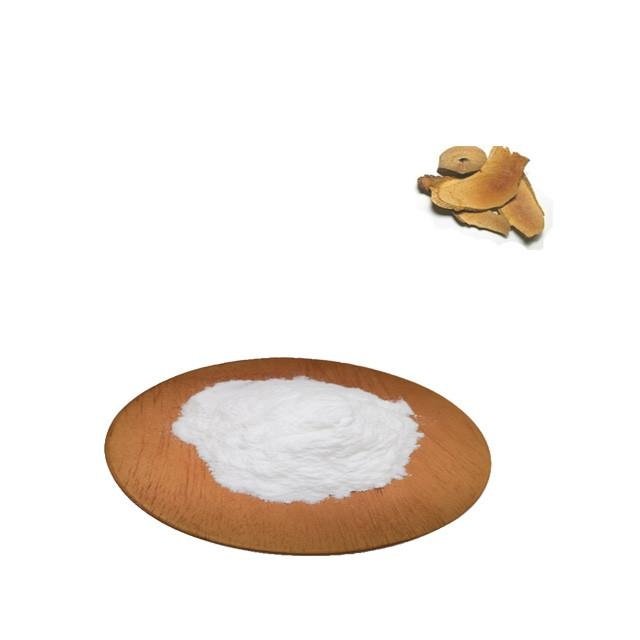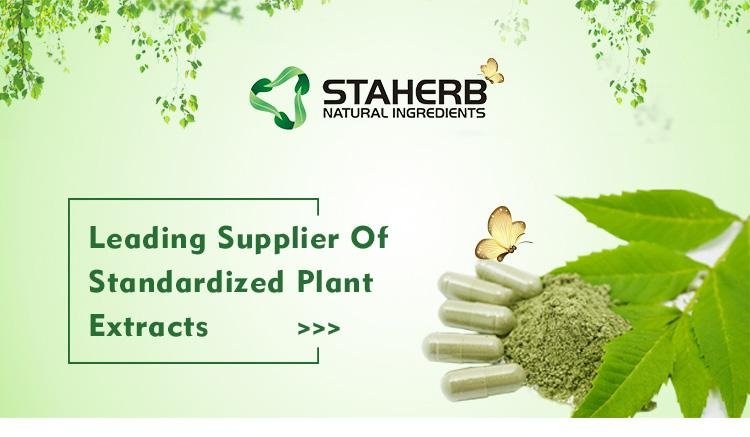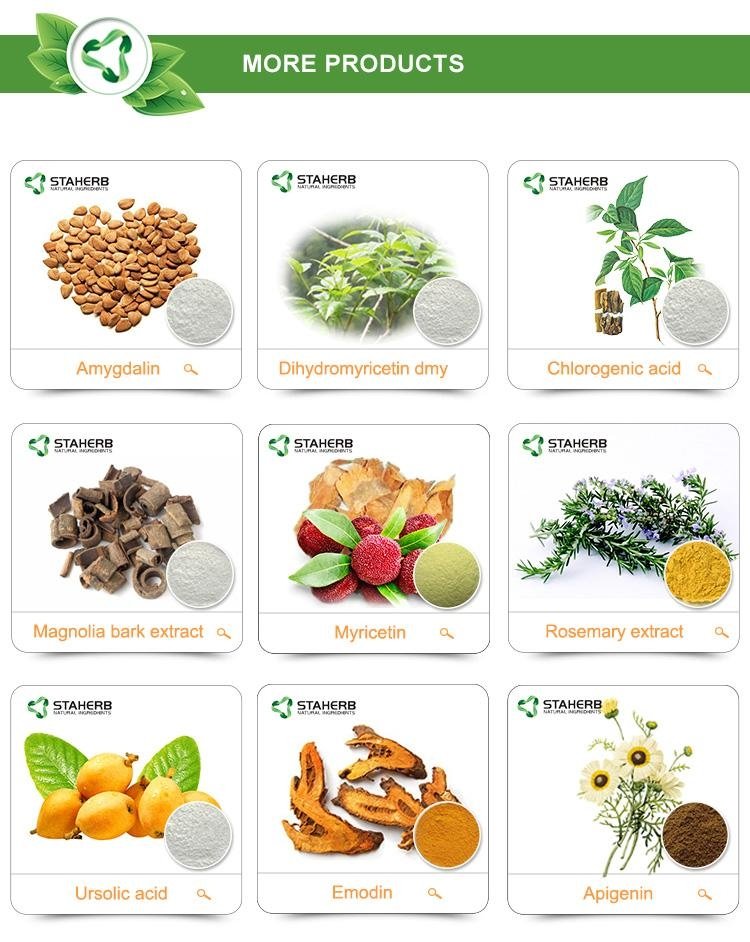
Resveratrol
Product name:Resveratrol
Source:giant knotweed
CAS no:501-36-0
Molecular Formula:C14H12O3
Test Methold: HPLC

About resveratrol
Resveratrol is a polyphenol compounds, mainly derived from grape (red wine), giant knotweed, peanut, mulberry and other plants.Resveratrol is a kind of biological strong natural polyphenols, also known as the three phenol stilbene, is cancer chemoprevention agents, is also to reduce platelet aggregation, the prevention and treatment of atherosclerosis, disease of heart head blood-vessel chemoprophylaxis agent.The United States department of agriculture research results show that the peanut and ren also contains a considerable amount of resveratrol in red.
Resveratrol Function:
2. Lower blood pressure and relax vascular smooth.
3. The function of drying dampness and kill worms.
4.Expel cold and the wind,to warm the kidney and strengthen the yin.
5.Antifugal and antivirotic.
1. Applied in food field, often used as additives, with distinct fragrance smell, it can promote digestion and increase appetite;
2. Applied in daily necessities field, aslo added into a large amount of oral cleaning products, such as dentifrices, mouthwash and tooth powder;
3. Applied in pharmaceutical field, because of the function of inhibition and paralysis to sensory nerve endings, it can be used as counter irritant.
For more product information pls kindly contact sales09@staherb.cn
Product Analysis
| Items |
Standards |
Results |
| Physical Analysis |
||
| Description |
White Fine Powder | Complies |
| Assay |
Trihydroxystilbene 98% | 98.12% |
| Mesh Size |
100 % pass 80 mesh | Complies |
| Ash |
≤ 5.0% | 2.85% |
| Loss on Drying | ≤ 5.0% | 2.85% |
| Chemical Analysis | ||
| Heavy Metal | ≤ 10.0 mg/kg | Complies |
| Pb | ≤ 2.0 mg/kg | Complies |
| As | ≤ 1.0 mg/kg | Complies |
| Hg | ≤ 0.1 mg/kg | Complies |
| Microbiological Analysis | ||
| Residue of Pesticide | Negative | Negative |
| Total Plate Count | ≤ 1000cfu/g | Complies |
| Yeast&Mold | ≤ 100cfu/g | Complies |
| E.coil | Negative | Negative |
| Salmonella | Negative | Negative |

- References:
- 1.Baur JA, Sinclair DA (2006) Therapeutic potential of resveratrol: the in vivo evidence. Nat Rev Drug Discov 5: 493–506
- 2.Bemis DL, Katz AE, Buttyan R (2006) Clinical trials of natural products as chemopreventive agents for prostate cancer. Expert Opin Investig Drugs 15: 1191–200
- 3.Aggarwal BB, Bhardwaj A, Aggarwal RS et al. (2004) Role of resveratrol in prevention and therapy of cancer: preclinical and clinical studies. Anticancer Res 24: 2783–2840
- 4.Joe AK, Liu H, Suzui M et al. (2002) Resveratrol induces growth inhibition, S phase arrest, apoptosis and changes biomarker expression in several human cancer cell lines. Clin Cancer Res 8: 893–903
- 5.Soleas GJ, Grass L, Josephy PD et al. (2006) A comparison of the anticarcinogenic properties of four red wine polyphenols. Clin Biochem 39: 492–497
- 6.Providencia R (2006) Cardiovascular protection from alcoholic drinks: scientific basis of the French Paradox. Rev Port Cardiol 25: 1043–1058
- 7.Ovesna Z, Kozics K, Bader Y et al. (2006) Antioxidant activity of resveratrol, piceatannol and 3,3’,4,4’,5,5’-hexahydroxy-trans-stilbene in three leukemia cell lines. Oncol Rep 16: 617–624
- 8.Athar M, Back JH, Tang X et al. (2007) Resveratrol: A review of preclinical studies for human cancer prevention. Toxicol Appl Pharmacol (in press)
- 9.Ovesna Z, Horvathova-Kozics K (2005) Structure-activity relationship of trans-resveratrol and its analogues. Neoplasma 52: 450–455
- 10.Pezutto JM (2004) Resveratrol: a whiff that induces a biologically specific tsunami. Cancer Biol Ther 3: 889–890
- 11.Aziz MH, Nihal M, Fu VX et al. (2006) Resveratrol-caused apoptosis of human prostate carcinoma LNCaP cells is mediated via modulation of phosphatidylinositol 3’-kinase/Akt pathway and Bcl-family proteins. Mol Cancer Ther 5: 1335–1341
- 12.Liao Z, Mason KA, Milas L (2007) Cyclo-oxygenase-2 and its inhibition in cancer: is there a role? Drugs 67: 821–845
- 13.Horvath Z, Murias M, Saiko P et al. (2006) Cytotoxic and biochemical effects of 3,3’,4,4’,5,5’-hexahydroxystilbene, a novel resveratrol analog in HL-60 human promyelocytic leukemia cells. Exp Hematol 34: 1377–1384
- 14.Murias M, Handler N, Erker T et al. (2004) Resveratrol analogues as selective cyclooxygenase-2 inhibitors: synthesis and structure-activity relationship. Bioorg Med Chem 12: 5571–5578
- 15.Benitez DA, Pozo-Guisade E, Alvarez-Barrientos A et al. (2007) Mechanisms involved in resveratrol-induced apoptosis and cell cycle arrest in prostate cancer-derived cell lines. J Androl 28: 282–293
- 16.Kampa M, Hatzoglou A, Notas G et al. (2000) Wine antioxidant polyphenols inhibit the proliferation of human prostate cancer cell lines. Nutr Cancer 37: 23–33